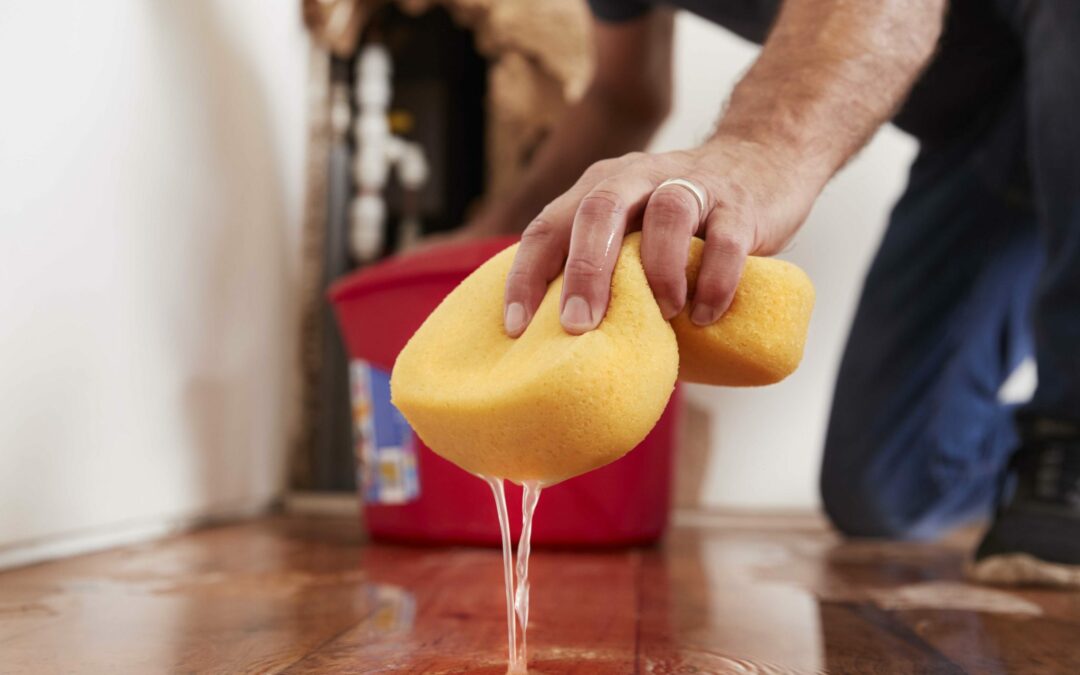As warmer weather arrives, many heating and air technician calls involve troubleshooting water leaking from HVAC units. Water buildup inside your home is never a good sign and should be attended to immediately to prevent damage to your AC unit and your home. If you notice a leaking AC unit, shut off your air conditioner at the thermostat right away. Water overflowing your air conditioning can be caused by several variables ranging from clogged air filters to low refrigerant. Here are the five top causes of water leaking from HVAC units and how to correct them.
Clogged Air Filter
We all know that you should change your air filter regularly for a variety of reasons, including keeping the air quality in your home clean and avoiding overworking your HVAC unit. Additionally, dirty, clogged air filters can block proper airflow over your unit’s evaporator coils, causing them to get too cold and freeze. The melting ice from frozen evaporator coils can cause more water than your HVAC drain pan can handle and result in an overflow. Depending on the type of air filter that you purchase, they should be changed out everyone 1-3 months.
Leaky HVAC Drain Pan
Your HVAC unit has a drain pan that collects water and filters it to a drain. Because the drain pan is exposed to moisture, it degrades over time and will eventually need to be replaced. Leaky drain pans are easy to spot as rust will typically accumulate in the weakened area. Using a wet vac to remove any standing water can help you more easily examine the drain pan for cracks or holes. For minor cracks or leaks in your drain pan, a water sealant solution may fix the issue, or you may need to replace the entire thing. Drain pans should be welded in place to prevent future problems.
Clogged Drain Line
One of the most common causes of water leaking from HVAC units is a clogged condensate drain. Thus, the drain line is the next area to investigate. If you discover that your AC condensation drain line is clogged, it will obviously need to be cleared before running your air conditioning again. This most likely involves using a plumbing snake to remove the obstruction. Over time, and as water flows through your condensation line, mold and mildew can begin to build up. As part of regular maintenance, you should pour 1-2 cups of bleach or vinegar into your condensation line every few months to keep it clean.
Broken Condensate Pump
If your drain line looks clear and your drain pan doesn’t show any signs of damage or leakage, the next part of your HVAC unit to examine is the condensate pump. The condensate pump is responsible for pushing water out of your home to the outside. If your condensate pump is broken or malfunctioning, then water builds up and will eventually leak out of the HVAC unit. An HVAC technician can test and replace a non-working condensate pump.
Low Refrigerant
Refrigerant is housed in your HVAC system to prevent your pressure from dropping and causing evaporator coil freezing. Other combined symptoms of low refrigerant in an HVAC system include the AC not cooling properly or a hissing or bubbling noise coming from refrigerant lines. If you suspect the coolant in your home’s cooling system is low, an HVAC technician in Knoxville or Oak Ridge can measure your levels and add more refrigerant if needed. Additionally, if you do have a leak in your refrigerant lines, it should be fixed immediately to prevent a full system shutdown.
Fixing Water Leaking from HVAC
If you have water leaking from your HVAC unit to the inside your home, contact City Heating and Air immediately to isolate your issue and get it fixed. An issue with your draining system can cause a myriad of problems besides water damage, such as toxic mold growth, bad air quality, and even complete air conditioner shutdown.
We offer 24-hour emergency HVAC services throughout the greater Knoxville and Oak Ridge areas. Backed by nearly 60 years of experience, our highly trained and certified staff are HVAC experts who can fix your heating and cooling problems. Call us at (865) 938-1005 in Knoxville or (865) 481-3288 in Oak Ridge to schedule a consultation.

